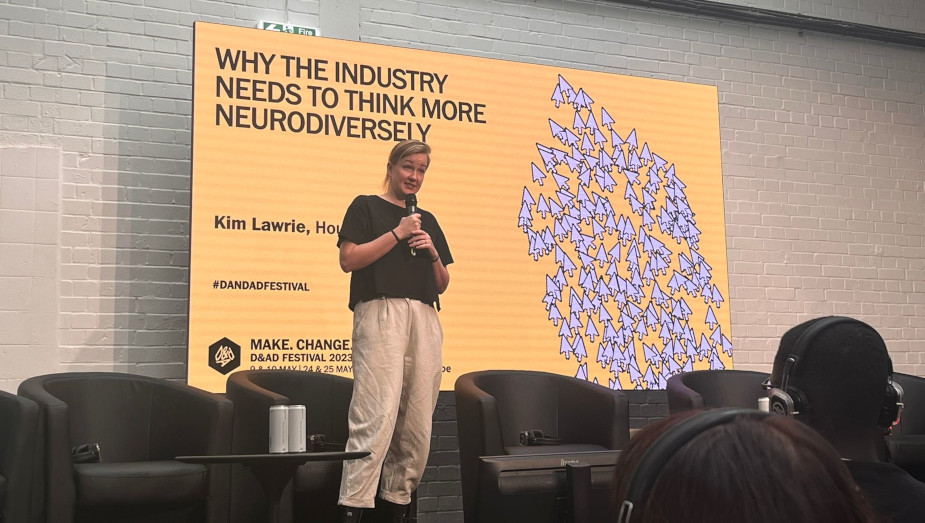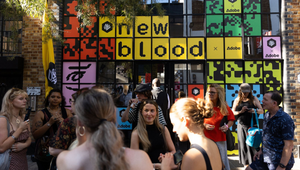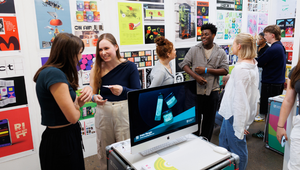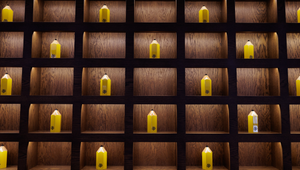
Why Adland Needs to Think More Neurodiversely

This year’s D&AD Festival saw its first ever talk solely about neurodiversity in the industry, led by Kim Lawrie, head of creative technology at House 337.
While adland promotes freedom of thought and creativity, as it’s continually optimising it starts leaving out anyone who thinks differently. Kim spoke about her own experience with having autism while working in creative media and how the shame and stigma that come with this have an enormous impact on a person’s productivity.
Kim began her talk with a positive trend: “Compared to this time last year, searches for neurodiversity are 800% higher, which is going in the right direction.” In her own experience, Kim spent 33 out of her 36 years not disclosing that she is on the autism spectrum, until three years ago for, as she put it, ‘a number of reasons’ - “People who are neurodiverse still really struggle disclosing it and don’t feel like they are in a safe environment to do so, because of their careers.” She shared that for her, these past three years have been the years where she has done her best work and has been the happiest in her profession yet.
She continued, “Out of all autistic people in the UK, only 20% are employed full time. 52% of neurodiverse as a whole are unemployed, meaning a lot of them cannot even begin to find a job, yet there is nothing concrete about what defines if somebody can or cannot physically work. There is at least 50% of people with autism who are physically able to and want to work, but are simply not welcome in our work culture.” Out of the 20% neurodiverse people who do have a job, a staggering 67% of them say that they are unable to or unwilling to disclose their neurodiversity to their employers or colleagues.
When gathering the statistics, Kim ran an experiment of her own. As head of creative technology, she applied to ten companies under a different name, all for junior roles. For five of the CVs she didn’t mention autism, and for five she owned the fact that she is on the spectrum and spoke about it more extensively. Surely enough, the five out of the five companies the CV for which didn’t mention autism called her back for an interview.
Out of the other five, Kim received no responses for three and rejections for the two remaining. “I know that door should be open logically, because of my experience, but it isn’t,” she said. After calling the companies that rejected her anonymously, to inquire about the reason behind the rejection, the answer was unanimous: “Culture fit”.
And while not everybody should be pushed to disclose if they are neurodivergent or not, Kim believes that the industry’s culture needs to radically change into one where not disclosing is a true personal choice, and not one informed by societal pressure.
“Paired with the right task, autistic people can be up to 150% more productive than their neurotypical peers,” explained Kim. “JP Morgan did a study around neurodiversity inclusion and found that where neurodiversity is discussed and embraced, companies experience a 40% higher retention rate. Not only through their neurotypical employees, but because everybody prefers working in an inclusive environment.” This simply means that given the right tools, neurodiverse people are more likely to join and more likely to stay in the industry, enriching it in ways that neurotypicals might not be able to.
With the views and stigma that comes with the idea of what an autistic person is or looks like, or just the sheer pressure from feeling like one needs to hide it from their peers, comes the shame. “There is a scientific impact of shame and we should talk about that more,” said Kim. “Neurodiversity carries with it a seven times higher incidence of permanent shame status in the brain, because we, as neurodiverse people, do not fit into the societal expectation about pretty much anything. This is why we mask and still end the day feeling ashamed of whatever we did or didn’t do. It’s not just in my head, there truly is a culture of judgement, which creates that state of shame in the brain as a survival response.”
She continued: “The prefrontal cortex, where creativity and productivity are stored, goes completely dark when the part of the brain that stores shame gets activated. You scientifically cannot function when you’re ashamed, so you go into fight or flight mode.” This also informs the dire statistics putting autistic people high on suicide incidence lists.
For Kim, at the most basic level, there is a responsibility on every person in the industry, in every role, regardless of seniority, to work harder to stamp out comments like ‘XYZ is autistic’. “If somebody does something that you find unexpected, try to look for the intention behind it. Educate yourselves and preach that knowledge to encourage others to learn too.” She also believes that changing the interview process is paramount to becoming more inclusive to neurodiverse people in the industry.
“The interview process is fundamentally flawed and outdated for everyone anyway. It has become a social skills check rather than a check on how you perform a role. There are many instances where autistic people could outperform in skill, but they can’t display that at an interview. Recognise when doors are closed in unexpected places and rally for them to be opened.” What needs to be done on an individual basis is to present neurodiverse colleagues with the tools they need to thrive in the work environment and fight any preconceived ideas of what ‘neurodiverse’ might mean, as well as to actively work to include neurodiversity into the DE&I agenda of all companies.
Finally, Kim spoke to those in the industry who live with neurodiversity: “We unfortunately live in a value based society, so you need to ask for the adjustments you need. Seek the environments that make you your best self, and self-advocate. Ask for the tools you need. It is worth it and it is ethically the right thing to do, to radically change the way we understand and embrace neurodiversity - this will ultimately create a new culture of real creativity and inspiration.”















